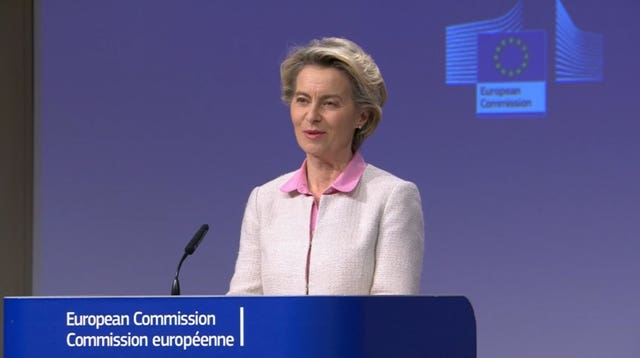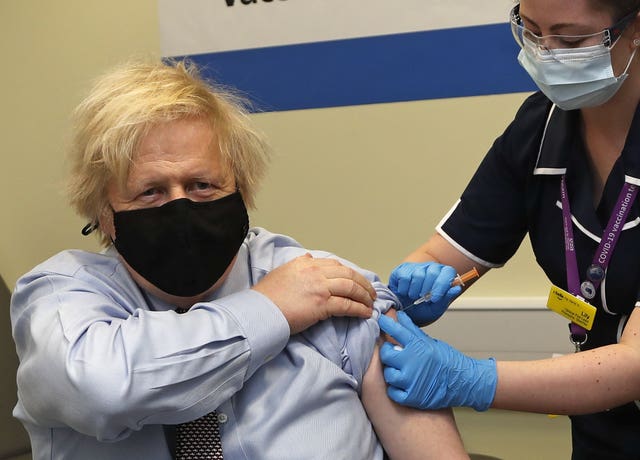
Boris Johnson has warned Britain must brace for another wave of coronavirus infections being imported from Europe as cases rise on the continent.
The Prime Minister said he expected the third wave of Covid-19 infections, seen in countries such as France and Italy, to “wash up on our shores as well”.
But Mr Johnson said he did not think the European Union wanted to block vaccine exports from reaching the UK, following suggestions Brussels could stop supplies from crossing the Channel amid struggles with its own rollout.
READ MORE: Coronavirus: Scotland has highest virus rate in UK amid concerns over spike in cases among young adults
Speaking to broadcasters at BAE Systems in Lancashire on Monday, Mr Johnson said: “I’ve talked to our (European) friends repeatedly over the period – we’re all facing the same pandemic, we all have the same problems.
“If there is one thing that is worth stressing it’s that on the continent right now you can see sadly there is a third wave under way.
“People in this country should be under no illusions that previous experience has taught us that when a wave hits our friends, it washes up on our shores as well.
“I expect that we will feel those effects in due course.
“That’s why we’re getting on with our vaccination programme as fast as we can but a vaccination campaign and developing vaccines, rolling them out – these are international projects and they require international co-operation.”
His comments come after several regions in France, including Paris, spent their first weekend under a limited month-long lockdown.
Labour’s shadow home secretary Nick Thomas-Symonds responded by calling for a “more comprehensive hotel quarantine system”, and said it was “unacceptable” that an enforced hotel stay applied to only 1% of international arrivals.
READ MORE: EU - UK Vaccines row: Can the EU actually introduce an export ban?
Care minister Helen Whately, speaking earlier, said it was “premature” to consider booking a holiday abroad with coronavirus rates on the rise elsewhere and urged Britons to “hold off” on making foreign travel plans.
She told BBC Breakfast: “What I would counsel is caution at the moment for people to hold off on booking because, as anybody can see, we are in a situation where there are rising rates in many countries in Europe and we know that also something that comes with rising rates is increased rates of variants.”
Ms Whately also, addressing the vaccines row with the EU, cautioned Brussels away from “vaccine nationalism” over proposals to block exports of coronavirus jabs to the UK.
European Commission president Ursula von der Leyen, who has come under pressure over the EU’s relatively poor vaccine rollout, had ramped up the rhetoric at the weekend, saying the EU had the power to “forbid” doses from leaving the bloc.
The threat reflects growing frustration on the continent that the EU is not getting the supplies it expected from the Anglo-Swedish pharmaceutical giant AstraZeneca, which is manufacturing the Oxford vaccine.
 European Commission president Ursula von der Leyen (PA Video screengrab)
European Commission president Ursula von der Leyen (PA Video screengrab)
Reports have suggested the latest focus of the row is on AstraZeneca vaccines produced in the Halix plant in the Netherlands, with officials arguing they should be kept for the EU rather than allowed to be exported to the UK.
The Prime Minister looked to cool talk of tension between London and Brussels over vaccine supply when asked about it on Monday.
Mr Johnson spoke to French president Emmanuel Macron and German chancellor Angela Merkel on Sunday, following talks earlier in the week with Ms von der Leyen and the Dutch and Belgian prime ministers Mark Rutte and Alexander De Croo.
“I’m reassured by talking to EU partners over the last few months that they don’t want to see blockades, I think that’s very important,” Mr Johnson told broadcasters.
The Prime Minister is expected to hold further conversations with his EU counterparts ahead of a virtual summit on Thursday where European leaders are due to consider a possible export ban.
Downing Street told reporters it remained “confident” in the UK’s vaccine supplies, and that the Government was “on track” to offer a jab to all those aged over 50 by April 15 and all adults by July.
 Prime Minister Boris Johnson received the first dose of AstraZeneca vaccine on Friday (Frank Augstein/PA)
Prime Minister Boris Johnson received the first dose of AstraZeneca vaccine on Friday (Frank Augstein/PA)
The use of the Oxford/AstraZeneca jab in Europe has been hit by fears over blood clots, although the European Medicines Agency concluded it was a “safe and effective” jab.
On Monday, data from a US-led trial showed the vaccine is 79% effective at preventing Covid-19 and offers 100% protection against severe disease.
The jab, which has been the subject of controversy in Europe over concerns about links to very rare blood clots, is also 100% effective at keeping people out of hospital with severe illness, the study found.
READ MORE: Freeman: 'We want to reach as many unpaid carers as possible'
Across the EU, just over 10% of adults have received a first dose of a Covid-19 vaccine but in the UK the figure is over 50%.
Meanwhile, the Prime Minister faces a showdown this week with lockdown-sceptic Tories over proposals to extend coronavirus laws for a further six months, taking them beyond June 21 when all restrictions are due to be scrapped.
Mr Johnson’s press secretary Allegra Stratton said he will “make the case” for renewing the Coronavirus Act’s emergency measures as part of his lockdown road map when he addresses the powerful backbench 1922 Committee of Tory MPs.
No 10 confirmed Mr Johnson will privately observe a minute’s silence on Tuesday “to all those who tragically lost their lives in the pandemic” as the country marks a year since the first lockdown.



Why are you making commenting on The Herald only available to subscribers?
It should have been a safe space for informed debate, somewhere for readers to discuss issues around the biggest stories of the day, but all too often the below the line comments on most websites have become bogged down by off-topic discussions and abuse.
heraldscotland.com is tackling this problem by allowing only subscribers to comment.
We are doing this to improve the experience for our loyal readers and we believe it will reduce the ability of trolls and troublemakers, who occasionally find their way onto our site, to abuse our journalists and readers. We also hope it will help the comments section fulfil its promise as a part of Scotland's conversation with itself.
We are lucky at The Herald. We are read by an informed, educated readership who can add their knowledge and insights to our stories.
That is invaluable.
We are making the subscriber-only change to support our valued readers, who tell us they don't want the site cluttered up with irrelevant comments, untruths and abuse.
In the past, the journalist’s job was to collect and distribute information to the audience. Technology means that readers can shape a discussion. We look forward to hearing from you on heraldscotland.com
Comments & Moderation
Readers’ comments: You are personally liable for the content of any comments you upload to this website, so please act responsibly. We do not pre-moderate or monitor readers’ comments appearing on our websites, but we do post-moderate in response to complaints we receive or otherwise when a potential problem comes to our attention. You can make a complaint by using the ‘report this post’ link . We may then apply our discretion under the user terms to amend or delete comments.
Post moderation is undertaken full-time 9am-6pm on weekdays, and on a part-time basis outwith those hours.
Read the rules hereLast Updated:
Report this comment Cancel